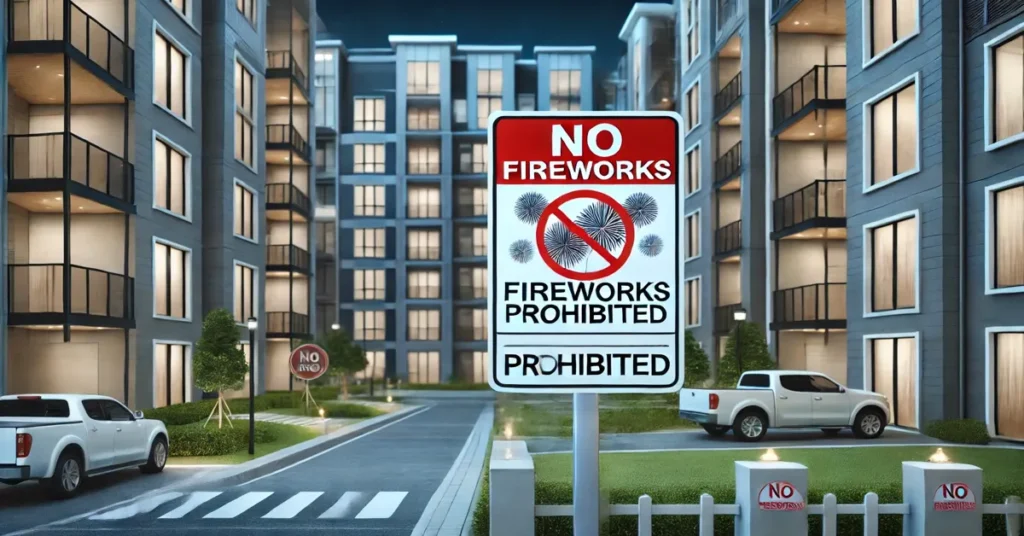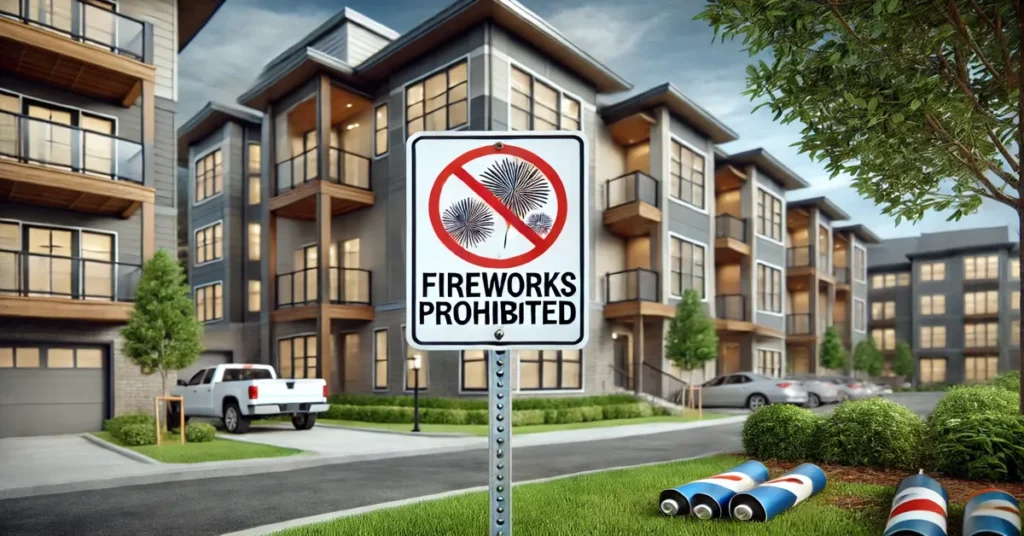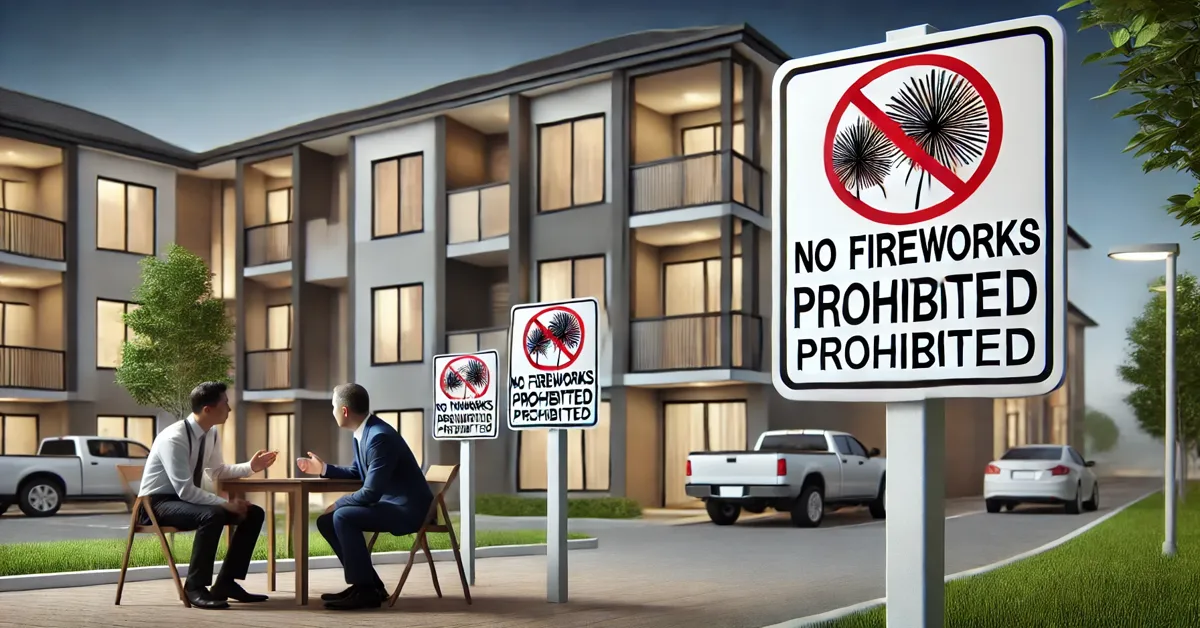Fireworks displays are often associated with celebrations, from national holidays to personal milestones, lighting up the night sky with bursts of color and sound. However, in residential settings, the use of fireworks can pose significant landlord fireworksprohibited notice risks and concerns, particularly when it comes to safety, property damage, and noise disturbances. For landlords, addressing these concerns proactively is critical to maintaining a safe environment for tenants and protecting property from potential hazards. One of the most effective ways to manage this issue is by issuing a “Fireworks Prohibited” notice to tenants.
In this article, we will explore the legal and practical considerations for landlords regarding fireworks on their properties. We’ll cover everything from the reasons behind prohibiting fireworks, the legal responsibilities of landlords, how to draft and deliver a fireworks prohibition notice, and how to handle potential tenant violations. By understanding landlord fireworksprohibited notice these elements, landlords can ensure they are fulfilling their duties while safeguarding their properties and communities.
The Importance of Prohibiting Fireworks
Fireworks, while often seen as harmless fun, can create a host of problems in residential settings. Understanding why it is necessary to prohibit their use is the first fireworksprohibited notice step for landlords in taking responsible action.
1. Fire Hazards
Fireworks are a leading cause of fire-related incidents, particularly in residential areas. Misfired or uncontrolled fireworks can ignite structures, dry grass, trees, or other flammable materials, leading to significant damage or even complete destruction of a property. As a landlord, the safety of your tenants and the protection of your property from fire hazards is a top priority.
2. Legal Liabilities
Landlords can be held legally responsible for injuries or damages caused by fireworks on their property. If a tenant uses fireworks and causes damage, not only could the fireworksprohibited notice tenant face legal consequences, but the landlord may also be implicated if they are found to have neglected their duty to prevent foreseeable hazards.
3. Noise Complaints
Fireworks produce loud noises that can be disruptive to neighbors and other tenants. For individuals with small children, pets, or those who simply prefer a quiet living environment, fireworks can be a major nuisance. Regular disturbances could lead to complaints, fireworksprohibited notice reduced tenant satisfaction, and even loss of tenants.
4. Personal Injury Risks
The risk of personal injury due to fireworks misuse is considerable. Fireworks can cause serious burns, loss of hearing or vision, and other injuries. Landlords must consider the welfare of all individuals on their property, not just the tenants fireworksprohibited notice themselves, and work to minimize preventable risks.
5. Insurance Complications
Allowing fireworks on your rental property can have insurance implications. Many insurance policies exclude coverage for damages caused by fireworks or other hazardous activities. Therefore, by prohibiting fireworks, landlords reduce the risk of uninsured damage to the property and costly out-of-pocket repairs.

Legal Responsibilities of Landlords
As a landlord, you have a duty of care to ensure your rental property is safe and habitable. While tenants are responsible for their own actions, landlords are tasked fireworksprohibited notice with setting rules and expectations that help maintain a safe environment. Failing to take action on known risks, such as the use of fireworks, could lead to legal consequences.
Local Laws and Regulations
Fireworks regulations vary by location. In some areas, fireworks are entirely prohibited, while in others, only certain types of fireworks are allowed. Landlords should familiarize themselves with local ordinances and fire codes that govern the use of fireworks in fireworksprohibited notice residential areas. If local laws already prohibit fireworks, the landlord’s notice will reinforce these laws and clarify expectations for tenants.
Lease Agreements and Addendums
If fireworks are a concern for your property, it is advisable to include a fireworks prohibition clause in the lease agreement. Alternatively, if fireworks become a concern after tenants have already signed a lease, landlords can issue an addendum to the existing lease to address the issue. Ensuring tenants are legally bound by the prohibition is a key step in managing fireworksprohibited notice potential fireworks-related issues.
Duty to Provide Safe Living Conditions
Landlords must ensure the rental property is free from unreasonable hazards. Fireworks, given their potential to cause fires or personal injuries, fall under this category of avoidable hazards. By prohibiting fireworks, landlords fulfill their obligation to provide a fireworksprohibited notice safe environment for all tenants and visitors.
Drafting a Fireworks Prohibited Notice
A “Fireworks Prohibited” notice is a formal document that informs tenants of the landlord’s policy regarding the use of fireworks on the property. The notice should be clear, concise, and legally enforceable. Below are the key elements to include when drafting such a notice:
1. Clear Statement of Prohibition
The notice should begin with a clear and direct statement that fireworks are prohibited on the property. Be specific about what is banned, including both possession fireworksprohibited notice and use of fireworks. For example:
“Effective immediately, the possession and use of fireworks of any kind are strictly prohibited on this property. This policy applies to all tenants, guests, and visitors.”
2. Explanation of Risks
Providing tenants with a brief explanation of why fireworks are prohibited can help ensure compliance. Mention the risks of fire, personal injury, property damage, and potential legal issues. Tenants are more likely to respect the rule if they understand the dangers associated with fireworks.
3. Reference to Lease Agreement or Local Laws
If the fireworks prohibition is already included in the lease agreement, refer to the specific section of the lease that outlines this rule. If local ordinances prohibit fireworksprohibited notice fireworks, mention these laws to reinforce the legitimacy of the notice.
4. Consequences of Violation
To ensure the notice is taken seriously, it is important to outline the consequences of violating the fireworks prohibition. Possible consequences could include fines, lease termination, or legal action. Be specific about what actions will be taken in the event of non-compliance.
5. Contact Information for Questions
Provide tenants with contact information in case they have any questions or concerns about the fireworks prohibition. It is helpful to encourage communication fireworksprohibited notice to clarify any misunderstandings or address specific concerns.

Delivering the Fireworks Prohibited Notice
Once the notice has been drafted, the next step is to ensure that it is properly delivered to tenants. Delivery methods will vary depending on the size of the property and the number of tenants, but the following are common ways to deliver the notice:
1. Email or Electronic Communication
For convenience and efficiency, landlords may choose to send the notice via email or a tenant communication platform. This method ensures that all fireworksprohibited notice tenants receive the notice quickly and allows for easy record-keeping.
2. Physical Notice
Posting a physical notice in common areas such as the lobby, community bulletin boards, or near mailboxes is another effective method, especially for properties where electronic communication is not feasible.
3. Individual Delivery
In some cases, landlords may choose to hand-deliver or mail individual notices to each tenant. This method is more time-consuming but may be necessary if personal contact or confirmation of receipt is important.
4. Include in Lease Renewal Packages
If the fireworks prohibition is a new policy, landlords can include the notice in lease renewal packages, ensuring that tenants are aware of the rule as they sign a new lease agreement.
Handling Violations of the Fireworks Prohibition
Even with clear communication and a formal notice, some tenants may still violate the fireworks prohibition. Landlords should be prepared to address fireworksprohibited notice violations in a fair and consistent manner.
1. Issue Warnings
For first-time offenders, landlords may opt to issue a formal warning, reminding the tenant of the policy and the consequences of further violations. Written warnings are advisable, as they provide a record of communication.
2. Impose Fines
If the violation persists, landlords can impose fines as outlined in the original fireworks notice or lease agreement. Make sure the fines are reasonable and fireworksprohibited notice legally enforceable under local regulations.
3. Eviction
In cases of repeated violations or serious infractions that result in property damage or injury, eviction may be the necessary course of action. Landlords should follow the legal eviction process, ensuring they have sufficient documentation of the tenant’s non-compliance.
4. Involve Law Enforcement
For significant safety concerns or illegal activity related to fireworks, landlords should not hesitate to involve local law enforcement. This step is particularly important if the use of fireworks presents an immediate danger to the property or its residents.
Preventative Measures to Avoid Fireworks Issues
In addition to prohibiting fireworks through notices and lease clauses, landlords can take proactive steps to minimize the likelihood of fireworks-related issues on their properties.
1. Tenant Education
Educating tenants about the risks associated with fireworks can go a long way in preventing problems. Consider hosting a safety meeting or sending out informational materials about fire safety during times of the year when fireworks are more likely to be used, such as the Fourth of July or New Year’s Eve.
2. Hire Security or Increase Surveillance
During holidays or events when fireworks use is common, landlords may choose to hire security personnel or increase surveillance around the property to deter tenants from using fireworks.
3. Provide Alternative Activities
If fireworks are banned on the property, consider organizing alternative celebrations for tenants. For example, hosting a community BBQ or watching fireworksprohibited notice a local fireworks display as a group can give tenants an outlet for celebrating without resorting to fireworks.
Conclusion
Prohibiting fireworks on residential properties is a critical safety measure that every responsible landlord should consider. By issuing a clear, enforceable notice and taking proactive steps to prevent
fireworks use, landlords can protect their properties, ensure the safety of their tenants, and avoid legal liabilities. Implementing and enforcing a fireworks prohibition policy demonstrates a landlord’s commitment to maintaining fireworksprohibited notice a safe and secure living environment for everyone.
FAQs
1. Can a landlord legally prohibit the use of fireworks on their property?
Yes, landlords can prohibit fireworks on their property by including a clause in the lease agreement or issuing a formal notice to tenants.
2. What happens if a tenant violates the fireworks prohibition?
If a tenant violates the prohibition, landlords can issue warnings, impose fines, or in serious cases, proceed with eviction.
3. Are there local laws that regulate the use of fireworks?
Yes, fireworks regulations vary by location. Some areas completely ban fireworks, while others may allow certain types under specific conditions. Landlords should always refer to local laws and ordinances when drafting their fireworks prohibition notice.
4. Can a landlord face legal liability for fireworks-related incidents?
Yes, if a fireworks-related incident occurs on the property, the landlord could potentially face legal liability, especially if they did not take reasonable steps to prevent the use of fireworks or ensure the safety of the property.
5. How should a landlord inform tenants about a new fireworks prohibition policy?
Landlords can inform tenants through various methods, including sending an email, delivering physical notices, or including the policy in lease agreements fireworksprohibited notice or renewals. It’s important to ensure all tenants receive and acknowledge the policy.
6. What alternative activities can landlords provide to tenants instead of fireworks?
Landlords can organize community events, such as BBQs, watch parties for professional fireworks displays, or other group activities that celebrate holidays fireworksprohibited notice without the use of fireworks. These alternatives can help tenants feel included in festive activities while maintaining safety on the property.











